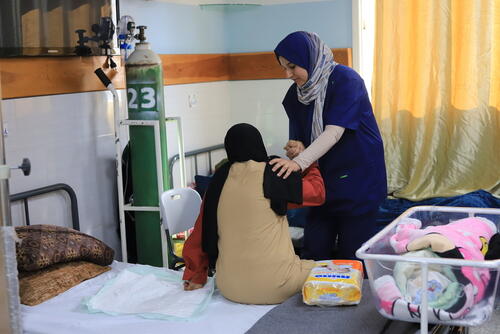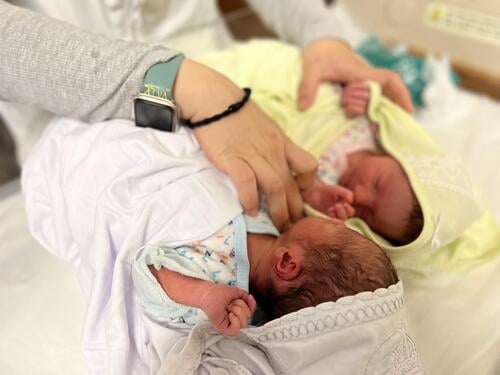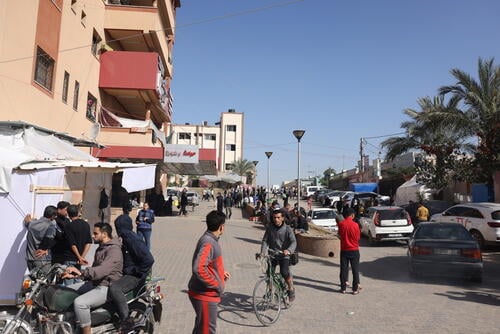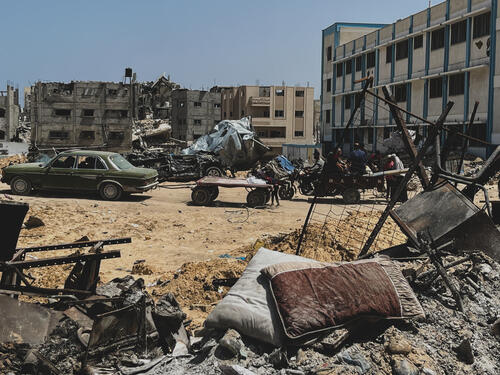Maha* went into labor as she arrived to the hospital, only to be turned away because all delivery rooms were full. Discouraged, she returned to her makeshift tent in the cold, one of many in Rafah’s camps for displaced people in Gaza, Palestine.
Rafah, a city in southern Gaza, housed 300,000 Palestinians before the war; that number has soared to 1.5 million, as Gazans have fled bombings and evacuation orders in the North and Middle Area of the enclave.
Unfortunately, Maha wasn't able to return to the hospital. She gave birth to her deceased son in a public bathroom.
The war in Gaza, marked by the dire lack of humanitarian aid and attacks on healthcare facilities, has completely disrupted access to maternal healthcare, exposing both mothers and their children to serious and even life-threatening health risks.
With so many people displaced, the situation in Rafah is terrifying. All places are overcrowded, with people living in tents, schools, and hospitals.Pascale Coissard, MSF emergency coordinator in Gaza.
In the Rafah area, the Emirati maternity hospital stands as the main remaining facility attending to the maternal health needs of displaced pregnant women.
The needs are enormous: according to the World Health Organization, an estimated 50,000 women are pregnant, and according to UNICEF an estimated 20,000 babies have been born since the start of the war.
Grappling with an overwhelming surge in needs and lack of capacity, the Emirati hospital can now only respond to the most urgent and life-threatening deliveries. Médecins Sans Frontières (MSF) teams are deeply alarmed by the deteriorating lack of obstetric care in Gaza, caused by the continuous bombings, restrictions on humanitarian aid, and attacks on healthcare facilities.
“With so many people displaced, the situation in Rafah is terrifying,” says Pascale Coissard, MSF emergency coordinator in Gaza.
“All places are overcrowded, with people living in tents, schools, and hospitals. The Emirati hospital is now dealing with three times the number of deliveries it handled before the war,” says Coissard.
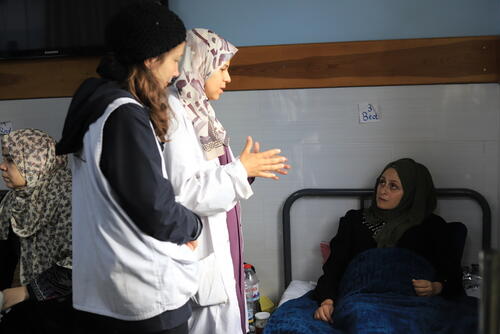
The humanitarian crisis unfolding in Gaza has left expectant mothers without medical check-ups for months, as basic healthcare services are virtually unavailable and women in labor are unable to reach hospitals because of the lack of fuel and capacity in the few remaining hospitals.
Displaced women living in deplorable conditions are giving birth in plastic tents and public buildings. Those who manage to deliver in a hospital often return to their makeshift shelters mere hours after undergoing a caesarean.
To reduce the risk of morbidity and mortality among mothers and newborns, MSF is supporting the Emirati hospital with postpartum care by adding 12 beds to the ward, to reach a 20-bed capacity, allowing more patients to receive proper monitoring post-delivery.
“Without enough supplies and too many patients, the healthcare system is overstretched, and mothers are forced to be discharged just hours after giving birth,” says Rita Botelho da Costa, MSF midwife activity manager.
“The first 24 hours postpartum are the riskiest for complications, and with people living in dire conditions, it’s important to keep the patient in the hospital as long as possible.”
I’m staying in a tent; life is hard, especially when it comes to finding food or water and sleeping without proper bedding.Abu Hameida, who was displaced from Beit Lahya.
With so little access to maternal health services, many pregnant women have not received any care since the start of the war, and haven’t been able to check on the health of their children.
At six months’ pregnant, Rana Abu Hameida was admitted to the maternity ward at the Emirati hospital because she was suffering from pregnancy complications. Rana hasn’t had an antenatal checkup since the start of the war.
“After I was displaced, it became difficult to get transportation and to find healthcare services,” she says.
Abu Hameida was displaced from Beit Lahya, in North Gaza, and like Maha, is now sleeping in a tent.
“It’s challenging to find a place for treatment or organise my life so I can resume monthly checkups. I’m staying in a tent; life is hard, especially when it comes to finding food or water and sleeping without proper bedding.”
When pregnant women don’t have proper access to healthcare, enough food, or adequate shelter, they and their children are more likely to experience health issues, including infections.
The children of malnourished pregnant or breastfeeding women are at immediate risk of health issues and potential long-term developmental challenges.
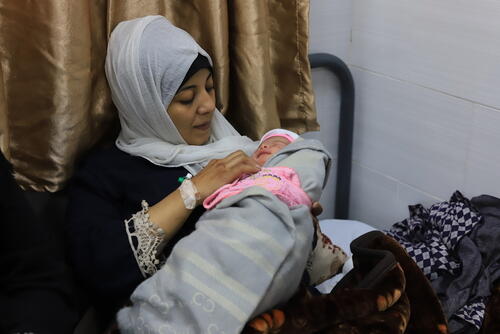
Over a third of patients seeking antenatal care have exhibited anaemia, a condition often associated with an iron deficiency, which is a critical concern for pregnant women who often require iron supplementation. Additionally, nearly half of these women had genitourinary infections, such as urinary tract infections.
In Rafah, our teams are providing postpartum care as well as mental health support in the Emirati hospital. In Al Shaboura Clinic, pregnant women are provided antenatal care including screening for malnutrition and given supplementary therapeutic food if needed.
In the first week of January, MSF gynecologists and obstetricians provided antenatal care to over 200 patients at the Al Shaboura clinic. In the Emirati hospital’s post-natal care ward, within the first week of expanding the ward, our teams received over 170 patients.
However, without sufficient humanitarian aid to Gaza and protection for the few health facilities that remain functioning, the provision of care will continue to be a drop in the ocean.
We reiterate our call for an immediate and unconditional ceasefire, and for the protection of health facilities to safeguard lives.
We also stress the urgency to promptly restore the flow of humanitarian aid into Gaza and re-establish the healthcare system, upon which the survival of mothers and children in Gaza critically depends.
*Name changed to protect identity.



